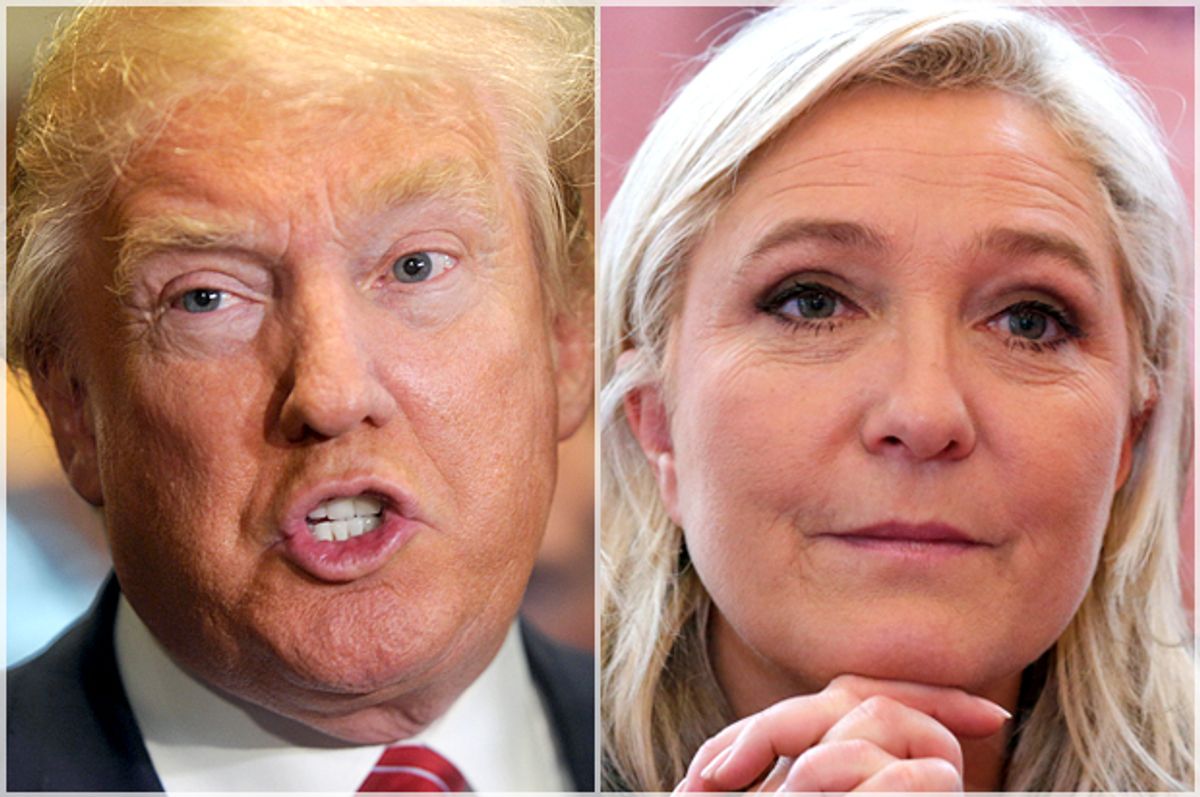The spectre of fascism has loomed over Europe for several years, and it’s reached a fever pitch. In France, the United Kingdom, Austria, Greece, Denmark, and Sweden, right-wing nationalist movements are gaining steam with every election.
In 2014, when elections were held for the European Parliament, it was evident that the political winds were shifting rightward. Thane Rosenbaum summarized Europe’s “Weimar moment” well:
“In some countries, like France, where fashion always matter, the voters gave the boorish National Front the largest share of votes. Similar extreme right-wing sentiment fueled the electoral outcome in England, where the United Kingdom Independence Party out-polled all other parties. In both countries, extremists captured more than a quarter of the vote…Things were only slightly better in Austria, Denmark, and Sweden. In Hungary, the demonstrably anti-Semitic Jobbik party finished second. In Greece, the Golden Dawn party, a neo-Nazi outfit that dresses in what looks like Nazi uniforms, captured seats for the first time. Even in Germany, where Nazi memorabilia and romanticism are outlawed, a neo-fascist claimed a seat…All across the Atlantic the fringe is looking more and more like the mainstream. These groups are generally united in their thuggery and xenophobia. Openly racist, anti-immigrant, and anti-Semitic feelings seem to be the first plank atop each party’s platform. To be sure, economic recession, the ongoing European debt crisis, and high unemployment contributed to this dash toward extremism, but anti-foreigner rhetoric ultimately dominated the campaigns.”
Everyone saw this coming.
There are very real fears in Europe, fears that we would do well to understand, however exaggerated they are. Against the backdrop of a disintegrating European Union, a global recession, a massive migration crisis, entrenched unemployment, the growth of Islamist movements and the recent Paris terror attacks, far-right parties have become all the more attractive to an increasingly paranoid and defensive populace.
This is fertile soil for fascism. And make no mistake: Fascism is not a political artifact of twentieth century Europe. History and human nature being what they are, it can – and almost certainly will – happen again. Fascism feeds on a stew of nationalism, militarism, and state power. And an enemy, real or imagined, is needed in order to whip people into a patriotic frenzy.
Muslims have become that enemy.
Over the weekend France’s far-right National Front (FN) won 30 percent of the national vote in the first round of regional elections, becoming the most popular party in France. The FN, as Salon’s Ben Norton noted, “runs on a harshly anti-immigrant and anti-Muslim platform. Le Pen [president of the FN], wants to eliminate immigration and make it much more difficult for migrants already in the country to attain citizenship. The FN says it has zero tolerance for undocumented immigrants, and hopes to ban dual nationality for non-Europeans.”
The rise of the FN is an indication of where France – and Europe more generally – is heading. Across Europe, parties that traffic in xenophobia and neo-fascism are finding more and more success in electoral politics, and right-wing demagogues are capitalizing on growing frustrations among their electorates.
And it’s impossible to miss the parallels in America.
In an interview with the Washington Post, Cas Mudde, a political scientist at the University of Georgia, argued that the fascistic undertones of Donald Trump’s campaign mirror those of Europe: “I see the phenomena as very similar. Trump is the functional equivalent of the far-right in Europe, he performs the same functions in the political system, and attracts the same kind of support…white, nativist, lower-educated and very unhappy with the establishment.”
A recent New York Times analysis of Trump’s rhetoric showed just how tinged with fascist language his speeches are:
“The most striking hallmark was Mr. Trump’s constant repetition of divisive phrases, harsh words and violent imagery that American presidents rarely use, based on a quantitative comparison of his remarks and the news conferences of recent presidents, Democratic and Republican. He has a particular habit of saying “you” and “we” as he inveighs against a dangerous “them” or unnamed other — usually outsiders like illegal immigrants (“they’re pouring in”), Syrian migrants (“young, strong men”) and Mexicans, but also leaders of both political parties.”
The emphasis on the “other” is crucial. Reactionary movements make considerable use of in-group/out-group tribalism. The goal is always to use the other’s otherness as a means of dehumanization. Fascist regimes need an enemy, something against which to define themselves. This is the basis for total unity under a common – often totalitarian – cause.
Trump presents a real challenge to our political system. It’s a mistake to think fascism – real fascism – can’t happen here, or that it would never look anything like it has in the past. That’s a dangerous illusion. It’s not at all implausible to say we’re one more terrorist attack or economic downturn away from something like a Donald Trump presidency.
Trump’s shtick is perfectly attuned to our chaotic climate. However ridiculous his ideas may be (and they are ridiculous), he’s exploiting legitimate fears among the populace. Radical Islamism is a real problem, and conservative aren’t wrong to be worried about it. Trump has nothing to offer in the way of solutions, however. He’s added nothing to the conversation but hysteria and hate. And that's all he'll do so long as he's part of our discourse.
The Left and Republican centrists have got to deny as much oxygen as possible to people like Trump, who flourishes in a media culture that prizes entertainment over news. If they don’t, bigotry and paranoia will subsume our politics. And the struggle against Jihadism will become a war against all of Islam, which is both wrong and counterproductive.




Shares